A crucial household or residential building appliance, the water heater delivers a continuous supply of heated water to all the water fixtures. Although the basic design is relatively straightforward, there are several diverse models of water heaters obtainable.
While all water heaters serve the same purpose, each type operates differently, giving it a unique set of benefits. Familiarizing yourself with the distinctions among the five primary types of water heaters can aid in selecting the most suitable option for your residence or project.
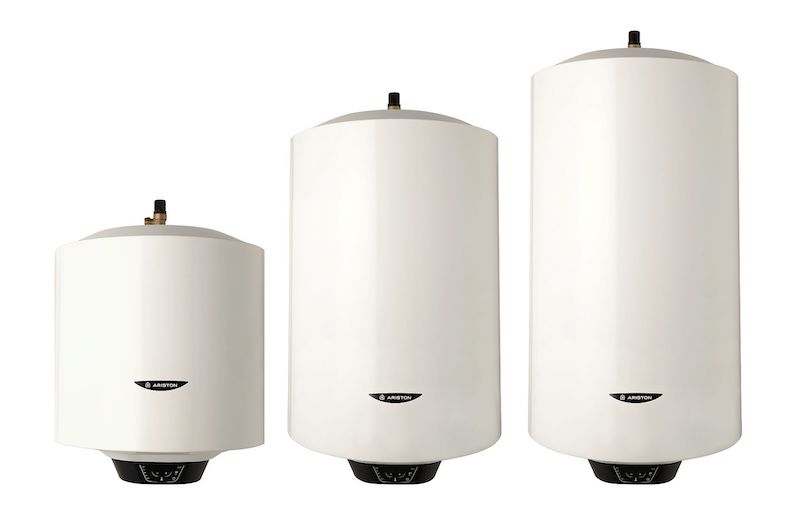
Storage Water Heaters
Storage water heaters are the most commonly used type of water heaters, functioning by heating a sizable tank to store hot water. These units can be powered by either gas or electricity, with gas models offering faster heating, while electric ones tend to be more cost-effective.
Pros of storage water heaters:
· Can provide hot water on demand, without the need to wait for the water to heat up
· Can supply multiple fixtures with hot water simultaneously
· Typically less expensive upfront compared to other types of water heaters
· It can work during power outages if gas-powered
· Relatively simple design and easy to maintain
Cons of storage water heaters:
· Limited hot water supply due to the size of the tank
· Energy loss from constantly keeping the stored water hot, leading to higher energy bills
· Potential longer wait times for hot water, especially in larger tanks
· Require a dedicated installation space due to their size
· Risk of leaks and water damage if the tank malfunctions or develops a crack
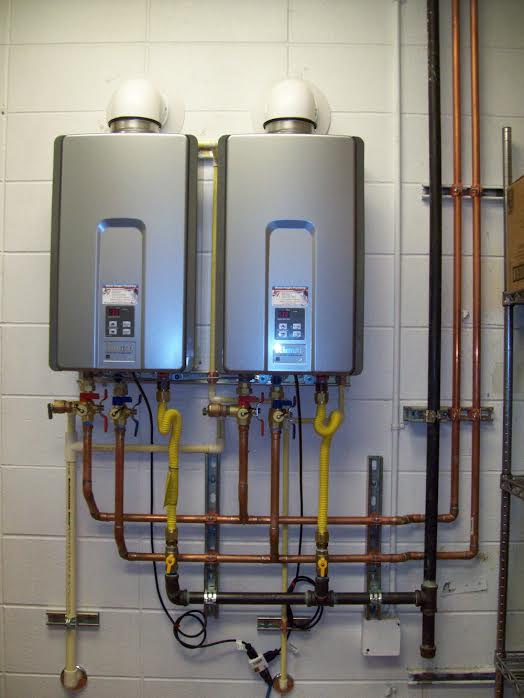
Tankless Water Heaters
Tankless water heaters heat water as needed, offering an almost endless supply of hot water. Unlike storage water heaters that constantly heat water in a large tank, tankless models only heat water when it is required. This makes them highly energy-efficient and cost-effective to use.
Pros of tankless water heaters:
· Can supply an almost limitless amount of hot water on demand, eliminating the need to wait for a tank to heat up
· More energy-efficient than storage water heaters, leading to potential cost savings on energy bills
· It can be mounted on a wall, saving floor space and allowing for more flexible installation
· Typically have a longer lifespan compared to storage water heaters
· Less risk of leaks and water damage compared to storage water heaters, as there is no large tank to crack or malfunction
Cons of tankless water heaters:
· Higher upfront cost compared to storage water heaters
· It may require upgrades to gas or electrical systems to accommodate the increased demand for power
· May struggle to supply hot water to multiple fixtures simultaneously, depending on the size of the unit
· It may require regular maintenance to prevent mineral buildup and ensure proper operation
· May experience a delay in delivering hot water due to the time it takes for the unit to heat the water
Learn more details about the pros and cons of tankless water heaters.
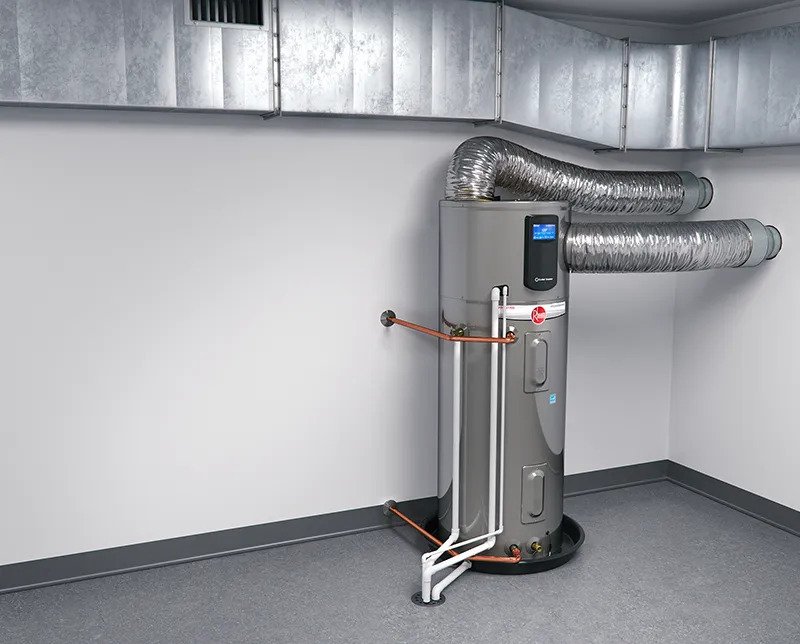
Heat Pump Water Heaters
Heat pump water heaters utilize a different mechanism than traditional heating elements by transferring heat from the air outside of your home to heat the water in the storage tank. This results in very low energy consumption, leading to significant cost savings in the long run.
Pros of heat pump water heaters:
· Extremely energy-efficient, potentially resulting in significant cost savings on energy bills
· Low greenhouse gas emissions, making them an environmentally friendly option
· Can be used in all climates, although they tend to perform better in warmer climates
· It can be used in conjunction with solar panels to further increase energy savings
· Typically have a longer lifespan compared to storage water heaters
Cons of heat pump water heaters:
· Higher upfront cost compared to storage water heaters
· It may require a larger installation space due to the need for the heat pump unit
· Performance may be affected by colder weather conditions
· It may require regular maintenance to ensure proper operation
· The sound generated by the unit may be louder than a traditional water heater.
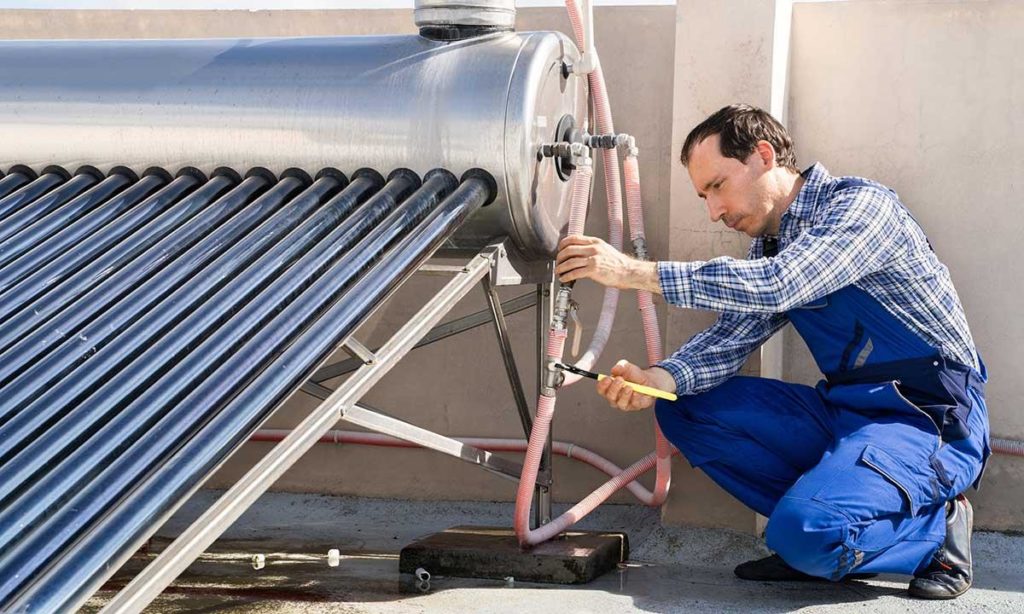
Solar Water Heaters
Solar water heaters use solar panels installed on your property to heat water. One of the main advantages of this type of water heater is that it is free to operate, providing hot water throughout the year. There are even solar water heating systems designed for use in colder climates.
Pros of solar water heaters:
· Free to operate, as they use energy from the sun rather than electricity or gas
· Environmentally friendly, with no greenhouse gas emissions
· This can potentially result in significant cost savings on energy bills over the long term
· It can be used in all climates, although performance may be affected by weather conditions
· May be eligible for government incentives and tax credits to offset the initial cost
Cons of solar water heaters:
· Higher upfront cost compared to storage water heaters
· It may require a larger installation space due to the need for solar panels
· Performance may be affected by weather conditions, particularly in areas with limited sunlight or frequent cloud cover
· It may require a backup system for periods of low sunlight or high demand for hot water
· Regular maintenance may be required to ensure proper operation and to prevent mineral buildup in the storage tank
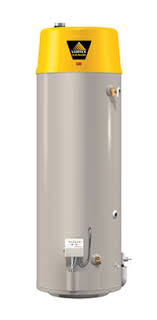
Condensing Water Heaters
The condensing water heater is the last one on our list of types of water heaters.
Condensing water heaters operate by harnessing the heat from exhaust gases that are normally lost in non-condensing systems. With a secondary heat exchanger, a condensing water heater extracts heat from exhaust gases, cooling them enough so that they transform into water. This releases extra heat that can be transferred to the water being heated. The end result is a more energy-efficient system that could lead to savings on energy bills.
Pros of condensing water heaters:
· Higher energy efficiency compared to non-condensing systems
· Reduced greenhouse gas emissions due to more efficient combustion of fuel
· Lower operating costs over time due to reduced energy consumption
· Large range of sizes and models available for various applications
· Compliance with current energy efficiency standards and building codes
Cons of condensing water heaters:
· Higher upfront costs compared to non-condensing systems due to the additional components required for condensation
· Potential for the condensate drain line to freeze in cold weather, leading to system shutdown
· Requires access to a drain line to dispose of the condensate produced by the system
· It may not be suitable for homes with existing non-condensing venting systems, as a new venting system may need to be installed
· It may require more maintenance than non-condensing systems, as the condensate produced can be acidic and cause corrosion if not properly drained and neutralized
For a better decision making, it is better to consult with a reliable HVAC company.
